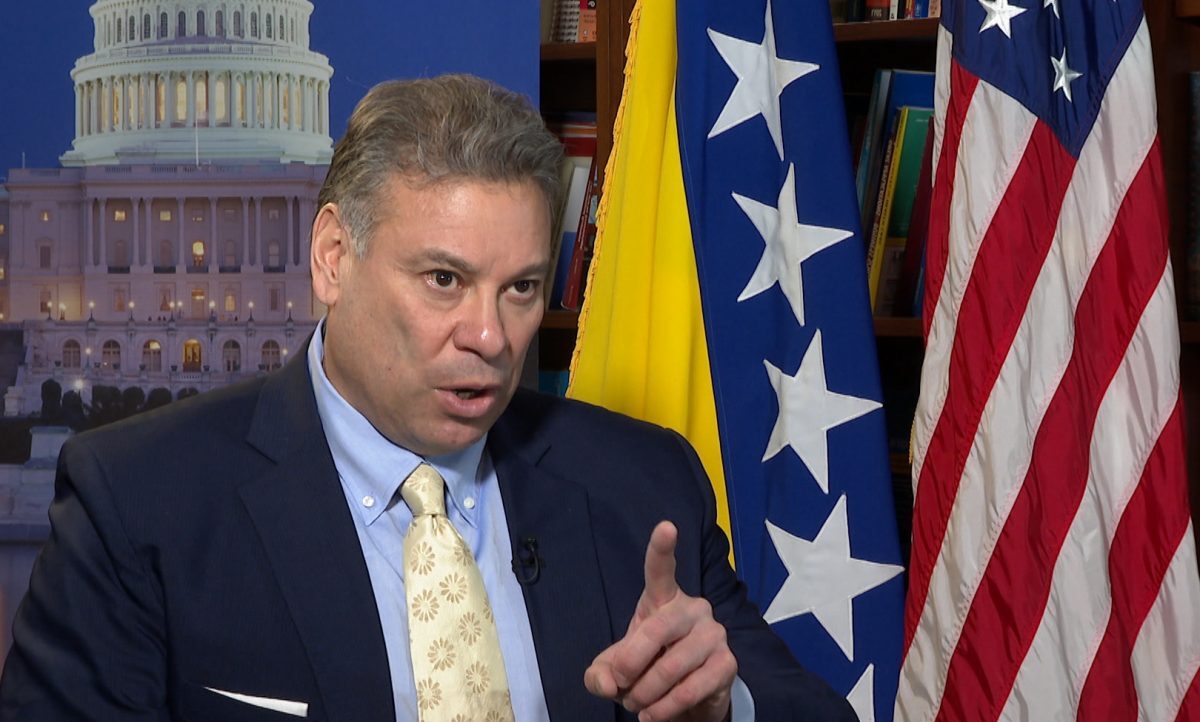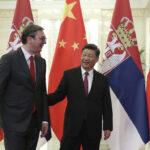On the occasion of the 80th anniversary of Bosnia and Herzegovina’s Statehood Day, an official reception was organized at the BiH Embassy in Washington. Gabriel Escobar, the U.S. Special Envoy to the Western Balkans and Deputy Assistant Secretary of State, attended the ceremony on behalf of Secretary of State Antony Blinken. In his speech, Escobar noted that of all the countries in which he worked, Bosnia and Herzegovina was the closest to his heart, and expressed unconditional support for its progress. When asked what the celebration of the Statehood Day of Bosnia and Herzegovina in Washington means to him, Escobar replied that it’s been a long time and that the U.S. is proud to stand by Bosnia and Herzegovina in support of its sovereignty and territorial integrity. He emphasized that the American attitude towards Bosnia and Herzegovina will not change. The basis of U.S. security is the partnership with Europe, including with BiH, which is considered a part of the European and Euro-Atlantic family, and there will be no changes in this sense. Escobar read out a greeting address by the Secretary of State, who stated that the United States remains a friend and partner of all the peoples of Bosnia and Herzegovina and will continue to work with all institutions to implement the reforms necessary for the country to take the place it deserves in the Euro-Atlantic community. In the address, it was also stated that the US will bring to justice all individuals and entities that pose a threat to the stability and security of Bosnia and Herzegovina, while expressing its continued commitment and support to BiH on its path to European integration.
The very next day, after Milorad Dodik’s latest statements about an “independent Republika Srpska” and a greater Serbia being a legitimate goal, the U.S. Embassy in Bosnia and Herzegovina announced that such statements will bear consequences and that Dodik’s chauvinistic views deserve a corresponding reaction, because Republika Srpska has no powers to decide on secession. The US Embassy believes that the separatist rhetoric of Milorad Dodik and his threats to secede from Bosnia and Herzegovina are dangerous, and that his destabilizing actions will have negative consequences not only for him, but also for all citizens of the country, wherever they reside. The rhetoric and actions of the RS leader endanger BiH’s European prospects, democracy, and economy. It was emphasized that the Constitution of Bosnia and Herzegovina is very clear: entities have no constitutional authority to secede from Bosnia and Herzegovina. The embassy stressed that the United States has repeatedly stated clearly that BiH is a sovereign state, and therefore remains committed to its territorial integrity and multi-ethnic nature. The U.S. will continue to prosecute those who try to undermine BiH and its institutions and destabilize the country and the region. Bosnia and Herzegovina is a multi-ethnic country that is home to three state-forming peoples — Bosniaks, Croats, Serbs, as well as some others. They are all Europeans; they are all Bosnians and Herzegovinans; and all are citizens of Bosnia and Herzegovina.
In connection with the statement of the US Embassy in Bosnia and Herzegovina, Dodik’s confidant Sanja Vulić, the head of the club of deputies in the House of Representatives at the Parliamentary Assembly of the ruling RS SNSD, voiced her reaction. She believes Dayton is the only chance for Bosnia and Herzegovina, and the illusion that it will be civil exists only in the imagination of Bosnians who work in the U.S. embassy, which is a wish penned by American ambassador Michael Murphy. Vulic said neither President Dodik nor the Serbian people are afraid of “Murphy’s hate and ill intentions, and this love has conquered everything, so it will also conquer Serb haters, too.” According to Vulić, Republika Srpska is eternal and is recognized by the General Framework Agreement for Peace in Bosnia and Herzegovina. She also recalled Henry Kissinger claiming Bosnia and Herzegovina was a fictional country.
Dodik himself also reacted to the American ambassador’s statement. He said Murphy in BiH is doing precisely all the bad things he accuses others of, destroying the Constitution of Bosnia and Herzegovina and supporting the suspension of the country’s parliament. The RS president believes that the rhetoric of the American ambassador is dangerous for Bosnia and Herzegovina, and that his actions are hostile to all citizens of BiH as he undermines the country’s sovereignty by trying to turn the nation into a protectorate.
Milorad Dodik and his accomplices do not dare to get into discussions around the statements of high-ranking U.S. officials, in particular those of Secretary of State Antony Blinken or Special Representative for the Balkans Gabriel Escobar, who has long worked in BiH and particularly in Banja Luka, where back in the day he helped Dodik reach higher political orbits. However, the disparaging comments by the RS president and his entourage toward Ambassador Murphy indicate a willingness to low-key challenge the American policy. Dodik holds a grudge against Washington over the sanctions imposed on himself and his children, as well as local sponsors of his family clan. However, the U.S. continues to act systematically and without unnecessary twists. At the same time, the RS president remains completely oriented toward the Kremlin’s policy, making populist statements about the traditionally friendly relations between the Russian and Serbian peoples. But he will never recall that it was Moscow that supported international sanctions against Serbia in 1992, when Russia was ruled by rather pro-democratic forces. Then the whole world accused Slobodan Milosevic and the Serbian chauvinists of igniting a war on the territory of the former Yugoslavia. Quite manipulative are the arguments voiced by Sanja Vulić, an official close to Dodik, who accuses the U.S. of the alleged human losses inflicted on the Serbian population in 1992, while Washington’s actions have always been solely about the reaction to the aggressive actions of the Bosnian Serb Army, which committed multiple war crimes, including the largest in the modern history – the killing of more than 8,000 Bosniaks in Srebrenica, which can be seen as an act of genocide. But Banja Luka adheres to the recipes of Moscow propaganda, which is to always shift the blame to whoever, while keeping silent about the crimes of its own. Republika Srpska practically did not celebrate the 80th anniversary of Bosnia and Herzegovina, while accusing Washington of allegedly destroying BiH’s foundations. There is a feeling that Dodik’s entourage constantly receives tips for their further actions from the Kremlin as they keep bringing up the events from the past, constantly trying to draw some parallels. Republika Srpska officials would have probably never even remembered about them but Moscow’s experienced propagandists come in handy there.



